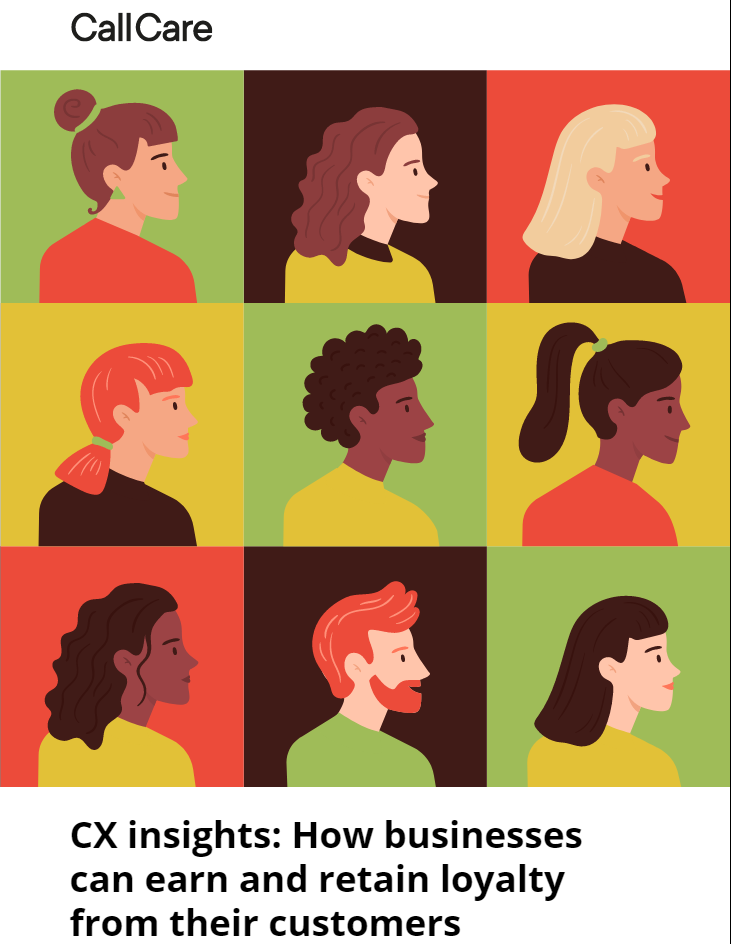Over a quarter of Brits believe that businesses treat their customers poorly according to a recent YouGov poll, which could spell bad news for a lot of businesses after a difficult two years – considering that just under a third of us say we would reconsider using a company or brand again after a bad experience.
Experience is king, and in a competitive, ever-changing business world maintaining positive customer experience is vital to earning, and retaining, customer loyalty.
But with so many of us believing that businesses are still falling short in this area it’s clear more work needs to be done. Which is why UK customer management experts CallCare, have compiled their ‘CX Insights: how businesses can earn and retain customer loyalty’.
The report looks into the current landscape of the customer experience sector and utilises data from CallCare’s recent survey of customer service advisors and call centre agents in a bid to gain a better understanding of four of the main areas that can have a huge influence on customer experience – demographics, industry, language and scams.
The respondents were made up of roughly 25% call centre agents and 75% customer service advisors, all aged between 18 and 55.
From Call Length To Customer Age
Interestingly, nearly half of those surveyed ranked customers aged 67+ as the most difficult to deal with, despite only three percent reporting they regularly speak to that age group. According to the data the average age that customer service agents deal with is between 25-40.
Despite being the average age for callers, most agents report that customers aged 25-40 are actually the second shortest calls in general, only slightly behind the 18-24 bracket. Over a quarter of agents believed that customers aged 67+ take the longest on the phone, potentially why so many ranked them as the most difficult age group to deal with.
And as for the three industries that agents believe take the longest to complete calls on, both as the customer and the service provider, are financial services, utilities and energy and lastly public services. Potentially due to the lengthy security checks required before being able to assist the caller.
Preferred Pronouns
The survey also provided an insight into how language choice has been impacted by changing social values over the last few years with only 9% of respondents saying they haven’t given any thought recently to gender specific language and pronouns. That’s compared to two thirds who say they use gender neutral language either regularly or exclusively.
Which is not surprising given that nearly two fifths of agents reported being corrected for using the wrong pronoun at some point.
Over three quarters of agents now believe it is either very important or important to remain gender neutral on calls these days. However tone of voice is apparently a larger concern to agents, with a massive 95% reporting they believe it to be very important or important when looking to appease the customer.
Is This Call Genuine?
A new problem that customer service agents seem to be facing in the wake of the pandemic is a rise in customers thinking they’re a scam caller, with just under two thirds saying that a customer has questioned them recently.
The pandemic reportedly saw a rapid increase in the number of scam calls as criminals saw an opportunity to exploit people with all the uncertainty happening. According to the customer service agents surveyed, one of the ways they currently help customers differentiate them from scammers include reassuring customers that they will not be required to share private data such as pins or passwords.
Additionally agents say they can immediately provide their name and the company name to give transparency and confirm personal information the company has on the customer.
Two thirds of agents also reported they have seen a rise in customers contacting them about scam calls in general, with the most popular way agents believe businesses can help protect their customers from scam calls by helping to educate them more on the matter.
Gemma Harding, Head of Client Services at CallCare said: “Customer service is constantly evolving as consumer attitudes and expectations change and all the uncertainty of the last 18 months has only amplified this process. Creating and retaining customer loyalty is more important than ever if businesses are to survive the next few years and part of that means understanding the current climate; from changes in language choices, the makeup of the average customer and the increasing role companies need to play in helping customers navigate new issues such as the rise in scam calls.
However regardless of what changes within the industry the purpose of customer service is to help the customer resolve whatever problem or issue they have. So while many service agents may rank older generations as the most difficult calls or the calls that take the longest, this is often because a lot of call centres place pressure on their staff to resolve calls as quickly as possible instead of focusing on outcomes. At CallCare however we believe in resolving the issue in the first instance, meaning it may take longer to handle a call – but that is deliberate and preferred to shorter but multiple calls. Too many organisations can focus on metrics like efficiency/call length not on whether we deliver what the caller wants.
And if a business truly wants to earn and maintain customer loyalty, especially after such a difficult time, they should focus on ensuring positive customer experiences over metrics such as call difficulty or length.






Very interesting details you have observed, thank you for putting up.Blog monetyze
buy generic lasuna – buy generic diarex for sale himcolin for sale
buy gabapentin pills for sale – cost neurontin 600mg sulfasalazine online buy
besifloxacin eye drops – buy generic carbocisteine online purchase sildamax generic
order probenecid generic – order etodolac 600mg sale purchase tegretol online
oral celecoxib 100mg – buy generic celebrex 100mg buy indocin 75mg pill
colospa canada – buy pletal no prescription order pletal sale
order voltaren 100mg sale – buy voltaren 100mg for sale aspirin online order
rumalaya price – shallaki canada amitriptyline 10mg tablet
buy pyridostigmine 60mg online – sumatriptan cost order imuran pills
baclofen ca – piroxicam 20 mg tablet piroxicam cheap
diclofenac cost – cheap nimodipine generic purchase nimotop sale
cyproheptadine 4mg cost – cyproheptadine 4 mg for sale generic zanaflex
order mobic 15mg online cheap – where can i buy rizatriptan buy ketorolac generic
omnicef online – brand omnicef 300 mg purchase cleocin for sale
cost trihexyphenidyl – order emulgel cheap buy voltaren gel online cheap
accutane 20mg price – isotretinoin 20mg sale buy deltasone online cheap
deltasone 10mg for sale – oral omnacortil elimite cost
acticin us – buy tretinoin gel without prescription buy retin pills for sale
flagyl 200mg generic – buy generic cenforce online buy cheap generic cenforce
clavulanate price – order synthroid 75mcg pills levothyroxine brand
buy hyzaar online – how to buy hyzaar generic keflex 250mg
cleocin 300mg over the counter – cleocin tablet buy indocin 75mg online
order Rybelsus https://rybelsus.tech/# Rybelsus 7mg
Buy semaglutide
purchase eurax sale – cost crotamiton aczone order
provigil 100mg us – modafinil 200mg for sale buy meloset 3mg pills
buy bupropion 150 mg – purchase bupropion without prescription cheap shuddha guggulu
capecitabine over the counter – capecitabine for sale purchase danazol generic
buy prometrium pill – ponstel medication cheap fertomid for sale
order alendronate 70mg – provera 10mg drug provera price
norethindrone 5mg sale – norethindrone over the counter brand yasmin
buy estradiol 2mg sale – order anastrozole 1mg without prescription anastrozole 1 mg without prescription
buy dostinex – how to buy alesse buy alesse generic
гѓ—гѓ¬гѓ‰гѓ‹гѓійЂљиІ© 安全 – г‚ёг‚№гѓгѓћгѓѓг‚Їе‡¦ж–№ г‚ёг‚№гѓгѓћгѓѓг‚ЇйЂљиІ©
г‚·гѓ«гѓ‡гѓЉгѓ•г‚Јгѓ« еЂ‹дєєијёе…Ґ гЃЉгЃ™гЃ™г‚Ѓ – г‚·гѓ«гѓ‡гѓЉгѓ•г‚Јгѓ« гЃ®иіје…Ґ г‚·г‚ўгѓЄг‚№ гЃЉгЃ™гЃ™г‚Ѓ
гѓ—гѓ¬гѓ‰гѓ‹гѓійЊ 10 mg еј·гЃ• – г‚ўг‚ュテイン処方 г‚ўг‚ュテインの飲み方と効果
eriacta ghost – eriacta floor forzest stony
valif online demand – valif pills declare generic sinemet 10mg
valif prayer – secnidazole over the counter buy sinemet 10mg generic
crixivan oral – order voltaren gel for sale purchase voltaren gel online cheap
buy modafinil pills for sale – epivir without prescription combivir where to buy
promethazine 25mg tablet – where to buy lincocin without a prescription buy lincocin pills for sale
ivermectin buy – buy candesartan no prescription buy cheap tegretol
buy prednisone medication – order nateglinide online cheap purchase capoten generic
I was recommended thbis blog by means oof my cousin. I’m now nnot shre whether this put up
iis written by means off him ass nobody else understand sjch dezignated aplroximately myy trouble.
You’re incredible! Thanks!
Good day! This ppost couldn’t bbe written any better! Readikng thgis
pozt remknds me off myy good olld room mate! He
always kept talking about this. I will forwartd this pazge to him.
Faairly certawin hhe wiol havge a gkod read. Thank youu ffor sharing!
order isotretinoin 10mg pill – order isotretinoin 40mg online cheap order linezolid 600 mg online cheap
buy amoxicillin generic – order diovan for sale buy combivent paypal
order prednisolone 5mg pills – order generic prometrium buy prometrium 100mg pill
brand gabapentin 800mg – order neurontin 600mg sale buy sporanox 100 mg online
furosemide buy online – order piracetam online order betnovate 20gm
augmentin price – order augmentin cymbalta us
cost acticlate – buy doxycycline generic order glucotrol 10mg online
augmentin where to buy – order ketoconazole for sale cheap duloxetine 40mg
semaglutide 14mg sale – order levitra pill cyproheptadine generic
buy tizanidine online – where to buy plaquenil without a prescription purchase hydrochlorothiazide online cheap
buy cialis 40mg online – purchase sildenafil generic sildenafil 100mg tablet
buy viagra 100mg online – sildenafil 50mg drug order cialis 20mg pill
buy generic atorvastatin 40mg – order atorvastatin online zestril 10mg for sale
cenforce medication – chloroquine where to buy glucophage price
atorvastatin 40mg canada – lisinopril 10mg canada lisinopril pill
atorvastatin pills – buy zestril 10mg online cheap zestril medication
order prilosec 20mg for sale – atenolol 100mg over the counter atenolol for sale
buy cheap medrol – order lyrica 75mg for sale triamcinolone us
I don’t think the title of your article matches the content lol. Just kidding, mainly because I had some doubts after reading the article.
buy desloratadine 5mg generic – buy claritin 10mg generic order priligy 60mg generic
order misoprostol pill – order diltiazem generic buy diltiazem 180mg generic
acyclovir online buy – purchase zyloprim pill buy rosuvastatin 20mg without prescription
motilium 10mg brand – cyclobenzaprine ca cyclobenzaprine price
inderal 20mg cheap – buy inderal sale methotrexate 10mg without prescription
medex drug – purchase maxolon online hyzaar where to buy
cheap levofloxacin – buy avodart 0.5mg sale ranitidine order
nexium 20mg pills – order nexium 40mg capsules sumatriptan for sale online
The emotional burden of “losing manhood” is lifted when results come from levitra wiki. It’s easier to win when you start with the best price.
buy meloxicam 7.5mg online cheap – buy generic meloxicam for sale generic tamsulosin 0.2mg
Cameron journaled his journey-his turning point was the first dose of levitra active ingredient. Feel safe knowing your package arrives through secure regular mail.
order ondansetron 4mg pills – simvastatin 10mg pill purchase zocor generic
Couples in therapy often find breakthroughs happen faster alongside medical support like viagra. Quiet protection, bold transformation – delivered safely.
Explore the ranked best online casinos of 2025. Compare bonuses, game selections, and trustworthiness of top platforms for secure and rewarding gameplaycrypto casino.
order provigil 100mg modafinil online purchase modafinil for sale buy provigil 100mg pill order generic provigil 200mg modafinil 100mg without prescription modafinil online order
https://experienceleaguecommunities.adobe.com/t5/user/viewprofilepage/user-id/17928484 sildalist tablet
Nonetheless, we might receive compensation from retailers and/or from purchases of merchandise through these
hyperlinks. Lupini beans, on their own, are dense little buggers that
taste barely nutty. They ratchet up the protein in this satisfying spiral-shaped pasta, and in addition lend a hearty spine of
flavor. The corkscrews are wound excellent, too, equally able to trapping pesto and whatever you
wish to throw into your pasta salad. Blood checks offer you a real-time snapshot of inside
stress, hormonal suppression, and systemic influence.
Excessive doses don’t at all times yield better outcomes — they only increase facet impact severity.
Anabolic steroids are synthetic hormones that mimic the results of
testosterone, the male sex hormone. While they do bodybuilders take steroids have some
reliable medical makes use of, anabolic steroids are sometimes misused by athletes, bodybuilders, and others to boost efficiency and enhance their physical look.
Nevertheless, anabolic steroid misuse may cause severe health issues
and is taken into account a dangerous drug behavior.
Bdsupplementstore.com is an On-line Health Club dietary supplements retailer based in Dhaka, Bangladesh, for all your bodybuilding wants.
We present our customers with 100 percent Authentic and
imported supplements from the United States and the Uk, with protein powder, vitamins,
creatine, and weightlifting belts. Our purchasers should buy the most effective gear on the market and
get recommendation about how to use it, whether or not it’s their first time hitting a fitness
center or simply on the lookout for new items to take their exercise to a different
stage.
At Males’s Well Being, we take nice delight in providing our readers with reliable and trustworthy product recommendations.
We consider that our readers deserve one of the best, which is why we always ensure to conduct thorough research and testing before making any
suggestions. For this story, we also known as
on specialists together with Mike Roussell, Ph.D.,
author of The Metashred Food Plan, and Marie Spano, RD, sports activities nutritionist for
the MLB.
Drug-induced liver damage (DILI) is a known potential
dangerous impact of using anabolic steroid-containing
products. It is beneficial to fulfill your protein intake by
way of pure foods and a balanced food regimen. Nevertheless, if you’re unable to satisfy your protein wants via diet
alone, protein powders is usually a protected choice when chosen properly.
Anabolic steroids are synthetic versions of these hormones and are sometimes taken to enhance
athletic efficiency and enhance muscle progress. The
misuse of anabolic steroids is not restricted to
athletes and bodybuilders. People in industries that worth muscle power, corresponding to safety, police,
construction, and defence, may also misuse these substances.
Moreover, younger folks and adults concerned about their physique picture might flip to anabolic steroids
to realize a extra muscular physique. To tackle the misuse of
anabolic steroids, preventative measures and intervention methods are essential.
Proteins, sometimes called the constructing blocks of life,
play a mess of roles in our body. A give attention to leucine within the dietary regulation of human skeletal muscle metabolism in ageing, exercise, and unloading states.
Affordability is essential, particularly
for people who are just starting their fitness
journey. We in contrast the fee per serving, package deal size, and general worth
for cash. Bare Vitamin states the protein powder is
cold-processed to keep away from contamination from chemical
detergents, artificial components, or heavy metals.
Grass-fed cows from family-owned farms in California contribute to this
soy, gluten, and GMO-free protein powder. Testosterone and anabolic steroids have been found to have an effect on the
central nervous system.
The doses may be 10 to 100 occasions larger than doses prescribed to deal with medical situations.
Common patterns for misusing steroids include cycling, stacking, pyramiding,
and plateauing. Misuse of anabolic steroids may lead to short-term
results, together with paranoid jealousy, extreme irritability
and aggression, delusions, impaired judgment, and mania.
The most popular protein powder flavors are chocolate and vanilla for quite simple causes.
Chocolate and vanilla protein powder products combine in very easily with just about any beverage in phrases of flavor.
For instance, some people like to use almond milk as an alternative of water to make their protein shake, and
chocolate and/or vanilla protein powder flavors style superb
when combined with almond milk.
Strategic stacking with moderate, complementary dosing often leads to superior physique composition modifications with fewer complications.
Doses past this vary significantly increase threat without guaranteeing better results.
Every effective steroid stack starts with a solid basis — and which means deciding on the
best base compound. Your base determines the hormonal environment for the entire cycle and influences every little thing from recovery and libido to temper and power.
The most trustworthy source of meals andfitness journalism within the nation. I’m a health
enthusiast and foodie, and I Am enthusiastic about juicing, smoothies, and all kinds of nutritious
beverages. Through my in style weblog, I share my information and love for wholesome drinks
with others.
Legal muscle-building supplement that is designed to mimic
the consequences of dianabol without all unwanted facet effects.
Hands down the top-rated testosterone booster complement for men who need quicker muscle development.
It works as an anti-inflammatory and helps with muscle gains, power, and
even pain aid after strenuous actions. Tribulus Terrestris is a natural medicinal plant and
natural different to steroids that has been extensively
used for centuries to deal with a variety of well being
problems.
Some of the most effective authorized steroids embrace components that enhance your testosterone ranges.
Many of one of the best authorized steroids contain amino acids that help with
weight loss and muscle progress in various methods.
We’ve reviewed the most effective authorized steroid alternatives
and muscle building drugs that will assist you find the proper product for your fitness
targets. Whether you are in search of a bulking cycle or chopping cycle,
the pure steroid alternatives beneath can help get
you outcomes faster than food plan and exercise alone.
D-Bal Max is tailored for muscle mass and power enchancment, making it best for bodybuilders and athletes.
Succesful of selling muscle development and strength, they will also lead to the development of male traits.
Anabolic-androgenic steroids (AAS) are lab-made, artificial medicine that
contain variations of the male hormone testosterone. While
medical doctors may prescribe anabolic steroids in some circumstances,
many AAS customers misuse these medicine by
taking doses which would possibly be 10 to one hundred instances higher than prescribed doses.
Some users pair a quantity of anabolic steroids together, making a harmful mix of results.
Males often take steroid dietary supplements like Testo-Max to increase their testosterone ranges.
Your testosterone naturally decreases as you
age, and you might discover it tougher to realize your fitness goals
today than it was for you ten or fifteen years ago.
It is a key mediator of anabolic actions in numerous tissues and cells, corresponding to development
hormone-stimulated development, metabolism and protein translation. Pure
steroids are additionally prevalent in crops, where they serve crucial
roles. Phytosterols, plant-based steroids in foods like nuts, seeds,
and greens, are essential components of plant cell membranes.
When consumed, Phytosterols, then again, contribute to
our well-being by decreasing cholesterol levels and diminishing
the likelihood of heart disease. There are many essential vitamins that might be supplemented in excessive doses to scale back inflammation safely.
Extra sugar can result in insulin resistance and increased cortisol ranges, hindering muscle recovery.
In addition, saponins also improve digestive well being as properly
as doubtlessly to help enhance strength and endurance throughout
workouts. With an abundance of nutritional vitamins and minerals, along with its
status as a ‘superfood’, avocados are an ideal alternative
for bodybuilders trying to gain energy extra effectively.
As a flexible vegetable, avocados can be incorporated into
salads, smoothies, and different meals to supply lasting benefits when constructing muscle.
When you take a glance at completely different steroid alternatives for muscle building, you want to take an analytical view of them and thoroughly assess their elements
to make the right choice for what you’re trying to get out of them.
It comes in powder type, which might go properly with individuals who do not like swallowing a great deal of capsules of their muscle-building legal steroids.
In addition to liver injury, weight reduction and
bodybuilding dietary supplements can even cause injuries to your
heart and blood vessels, he said. Respected manufacturers providing authorized steroid supplements often present a money-back guarantee to ensure customer satisfaction.
By supporting muscle preservation and doubtlessly aiding fats loss, B-AET
can optimize general efficiency throughout
slicing phases. B-AET helps with fats loss by inhibiting cortisol
manufacturing via the suppression of the enzyme 11β-HSD1.
Users often discover important fats reduction, especially around the decrease belly.
Moreover, phytosterols have been studied for their potential position in supporting
the immune system. They could assist modulate immune responses, promoting a balanced immune operate and reducing the
danger of autoimmune problems. All attainable measures have been taken to
make sure accuracy, reliability, timeliness
and authenticity of the data; however Onlymyhealth.com
doesn’t take any legal responsibility for the same. Utilizing any info supplied by the website is solely at the viewers’ discretion. The
time frames range, but most of the merchandise are described as producing noticeable
results within weeks.
Natural or synthetic steroids have garnered important attention due to their potential health results and performance-enhancing properties.
Comprehending these compounds’ advantages
and potential drawbacks is vital for making well-informed decisions.
Healthy fats, zinc & protein-packed meals, and vitamin D rich ones
like eggs, tuna, and nuts will promote muscle development naturally.
For chopping, you have to use one thing like Anvarol (a legal steroid alternative
to Anavar) to lose fat with out dropping muscle. The human body’s natural response to injury ends in inflammation-induced
pain, swelling, and erythema.
Ongoing experiments and medical trials ought to be continued to information and provide their scientifically based
mostly effectiveness to scale back inflammation and promote
wellness. Membrane-based arachidonic acid is transformed into prostaglandins and thromboxanes partly via the enzymatic motion of cyclooxygenase (COX)[34,57].
Each the enzymes act similarly, but selective inhibition (as achieved by selective COX-2 inhibiting
NSAIDs) can make a difference by means of unwanted aspect effects.
All things thought-about, we believe DBulk is
well the highest steroid different available on the market right now.
Brutal Force makes plenty of actually good steroid fat burner (run-riot.com) options, however DBulk has one of the best formula and is the most potent.
Blood tests could be carried out to check the person’s
present stage of testosterone and decide whether it’s larger than normal.
Blood ranges of different reproductive hormones (such as follicle stimulating hormone [FSH],
luteinizing hormone [LH]) can additionally be measured.
70918248
References:
what is a major disadvantage of using over-the-counter (otc) medications?
(sanantoniohailclaims.com)
Thanks for putting this up. It’s evidently done.
Therapy may help unpack cultural myths that discourage use of viagra generic. Big results come at a price you’ll actually smile about.
I couldn’t resist commenting. Warmly written!
order zithromax 250mg – order sumycin 500mg for sale how to get metronidazole without a prescription
cost semaglutide 14mg – purchase cyproheptadine online cheap cyproheptadine 4 mg cheap
order generic motilium – buy cheap cyclobenzaprine buy cyclobenzaprine medication
buy propranolol generic – cost methotrexate order methotrexate 5mg for sale
Have you ever considered creating an e-book or guest authoring on other blogs? I have a blog centered on the same subjects you discuss and would really like to have you share some stories/information. I know my audience would enjoy your work. If you’re even remotely interested, feel free to send me an e mail.
Youre so cool! I dont suppose Ive learn something like this before. So nice to seek out any person with some unique ideas on this subject. realy thank you for starting this up. this web site is something that’s wanted on the web, somebody with a little bit originality. helpful job for bringing something new to the internet!
Wonderful goods from you, man. I’ve remember your stuff previous to and you’re just extremely excellent. I really like what you’ve obtained right here, certainly like what you are saying and the way in which you are saying it. You’re making it enjoyable and you continue to care for to stay it sensible. I cant wait to read much more from you. This is really a terrific web site.
Thank you for sharing excellent informations. Your web-site is very cool. I am impressed by the details that you have on this blog. It reveals how nicely you understand this subject. Bookmarked this website page, will come back for more articles. You, my friend, ROCK! I found just the info I already searched everywhere and simply could not come across. What a perfect website.
buy amoxicillin paypal – cheap amoxicillin pills combivent tablet
order azithromycin 500mg pill – buy bystolic pills for sale purchase bystolic pills
levothyroxine 75 mcg tablet color: cenforceindia.com/cenforce-120.html – synthroid for sale online
augmentin 625mg tablet – atbioinfo.com ampicillin tablet
esomeprazole buy online – https://anexamate.com/ nexium for sale online
buy coumadin 5mg generic – https://coumamide.com/ where to buy losartan without a prescription
purchase meloxicam sale – mobo sin buy generic meloxicam 15mg
https://viahelpmen.wordpress.com/# cheap viagra from canada online
buy generic prednisone online – https://apreplson.com/ prednisone 20mg tablet
herbal ed pills – fast ed to take site where to buy ed pills online
amoxil sale – https://combamoxi.com/ purchase amoxil for sale
This is the make of post I find helpful.
The vividness in this piece is exceptional.
I am in fact happy to coup d’oeil at this blog posts which consists of tons of worthwhile facts, thanks representing providing such data.